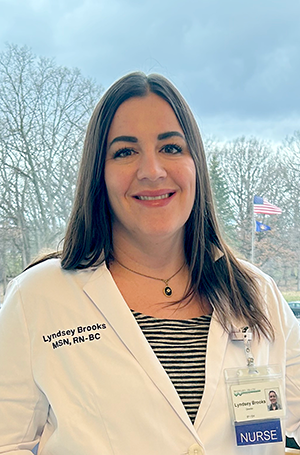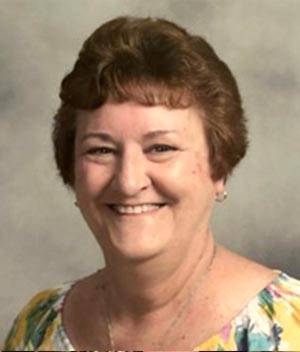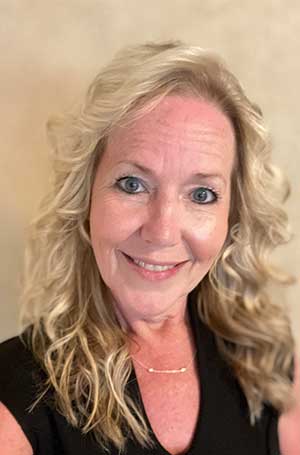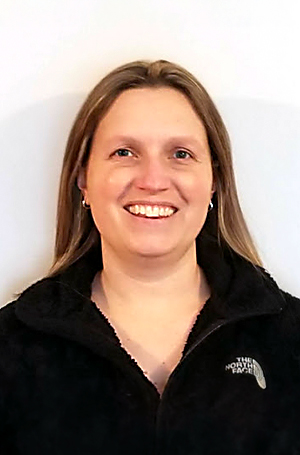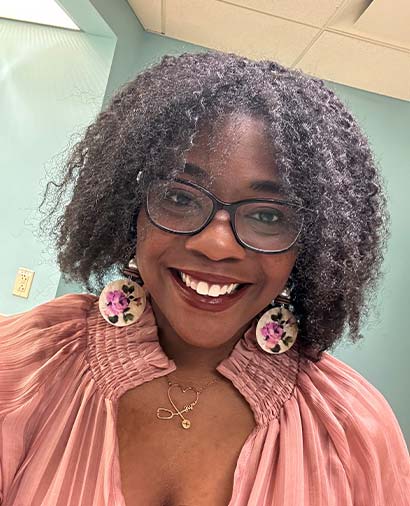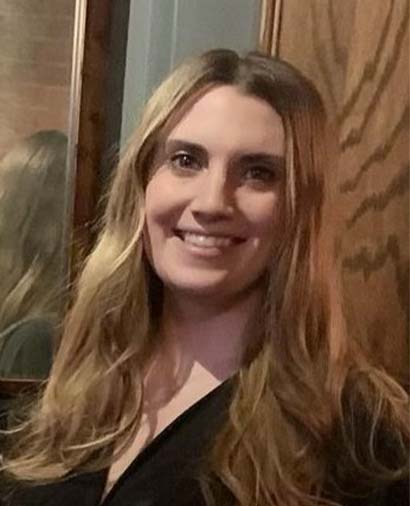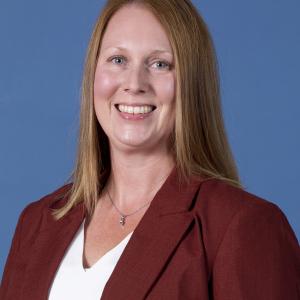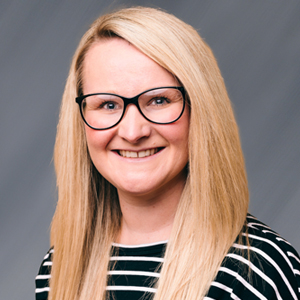Graduation Year:
December 2013Current Employer/Position/Title/Location:
Director of Infection Prevention and Employee Health, Woodlawn HealthHometown:
Culver, IndianaAdditional Education (degree and school):
MSN Nursing Leadership – Olivet Nazarene University, 2017
BSN Nursing – Saint Joseph’s College, 2013
Certifications:
Certified Healthcare Simulation Educator (CHSE)
Nursing Professional Development (NPD-BC)
Lyndsey Brooks MSN, RN, NPD-BC, CHSE, a graduate and previous faculty member of St. Elizabeth School of Nursing, is a prime example of the many ways in which a nurse can serve her community. From patient care to professor and now director of Infection Prevention and Employee Health, Lyndsey has experienced a variety of important work in healthcare and has great advice for those who are thinking about following in her path.
Learn more in the Q & A below!
Why Did You Become a Nurse?
I originally wanted to become a doctor. When I first entered college (biology at Purdue), I trained and worked as an EMT so that I could get patient care experience under my belt for when I applied to medical school. After spending time in the ER and observing the healthcare environment, I realized that the personalized level of care I sought to provide was coming from the nurses. So, I switched my major to nursing and transferred to St. Elizabeth School of Nursing.
What is Your Best Memory From Nursing School?
Nursing school was such a whirlwind for me. Like all nursing students, I had a lot going on in my life, and I had very little time for fun. The best memories come from my professors. I remember having the best time in our in-house clinicals with Professor Catron. We were learning the fundamentals like placing a bedpan and putting on T.E.D. hose, but she made it memorable! I also remember really enjoying my senior clinicals with Dr. Blissitt. She made us feel like we could actually do this. She helped give us the realistic skills that we needed to be good nurses in today’s healthcare environment. There were so many great experiences. It was amazing to be able to work with these professors as colleagues once I started working at St. Elizabeth School of Nursing.
What advice would you give to new nurses?
I have two pieces of advice:
a. Don’t push yourself so hard in your first year that you lose your purpose and your drive. As nurses, we are exposed to a lot of sad, traumatic things. If you don’t take care of your emotional and physical health, these traumatic experiences can really impact your personal and professional life. You need to find ways to process your feelings at work and come home to your family at the end of the day with compassion and love in your heart.
b. Nursing is a rapidly growing field. Best practice changes every day and as nurses, we have a responsibility to stay informed and ensure that we are providing the best, evidence-based care possible. Even if you tell yourself, “After I graduate, I just want to work and be done with school,” there will come a time when you need more. Let that more develop into a spirit of inquiry. Get engaged in your area of practice. Ask yourself every day, “What can we do better?” Just because something has been done a certain way for a long time, doesn’t mean that is the best way. Keep an open mind!
How Did St. Elizabeth School of Nursing Prepare You for Your Career?
For several years, I worked with the novice nurse residency program at Franciscan Health Western Indiana. Through this experience, I got the opportunity to work with novice nurses from nursing schools located all over the state and country. Through my experience, one thing was apparent, the St. Elizabeth School of Nursing graduates were strong clinically and had strong, clinical judgment. While all schools of nursing aim to prepare their students for real practice, St. E does a phenomenal job at this task. St. E gave me a diverse clinical experience that few nursing schools are lucky enough to offer. Some people enter nursing school knowing exactly what area they want to be in. Some of us don’t know until we experience it. St. E did such a great job of placing us in clinical environments that were unique. We got to care for patients in rural and urban areas. The strong community connection gave us a strong understanding of social determinants of health and the needs of our community. The non-nursing coursework that we did as a part of the BSN program prepared us well for leadership roles as it gave us a strong foundation in ethics, sociology, management, delegation, etc.
If you weren’t a nurse, what would you be?
I would probably still work in the science field.
What Was Your First Job in the Field After You Completed Your Degree?
I worked at Sycamore Springs as a registered nurse, specializing in the geriatric-psych patients. I had worked as a patient care assistant at Franciscan Health while I was in nursing school, but unfortunately, there was a hiring freeze at Franciscan when I graduated (due to consolidating units to the Lafayette East campus) so I had to leave my “home” for a few months until hiring resumed. After that, I joined 3 North Inpatient Medical.
Tell us a little bit about working for St. Elizabeth School of Nursing.
I was a professor at St. E from 2019 to 2023. I primarily taught medical-surgical clinicals. I worked with students from freshmen to seniors. I taught in many areas, such as infection, immunity, inflammation, wounds, pain, sensory and more. During my time with the school, I was heavily engaged in simulation and worked to increase high-fidelity and virtual simulation use in the program. I cannot say enough about my experience working there. The faculty team is a true TEAM and is always ready to help each other out. Michelle Gerrety is extremely supportive as a director and always made me feel that she was advocating for our staff and students. I had to leave the school due to relocating my family, but it will always hold a special place in my heart.
What do you do now?
I am currently the director of Infection Prevention and Employee Health. A large part of my job entails surveillance of infections in our facility and in our community clinics. When certain reportable infections pop up, I work with various agencies, such as the Health Department, to ensure that these patients are being monitored and treated appropriately. I also work in the hospital to ensure we are meeting all regulatory and best-practice guidelines related to infection prevention. I also help with onboarding all new employees and ensuring that their immunization and health requirements are met upon hire and annually.
What do you like most about your current job?
I like that I get to be actively informed on epidemiology in our state and current evidence-based practice standards. I spend a lot of time analyzing epidemiology data in our facility and surrounding clinics and collaborating with many agencies to ensure that patients are not slipping through the cracks. One of my favorite parts is coming into this organization with fresh eyes to implement change.
What is the toughest part about being a nurse?
For me, the most difficult part about being a nurse has always been that patients oftentimes need so much more help and care than I can give them alone. So many patients struggle with mental health issues, poverty and lack of resources, which makes it extremely difficult for them to recover from an illness. Working in a system that is designed to operate in a way that does not allow the nurse to provide all these resources is often disheartening.
Another tough part of being a nurse is learning to separate your personal feelings from your interactions. I always told my students that as a nurse, it’s your job to be the strong one. This is a skill set you develop, just like starting an IV. When you care for patients, it’s oftentimes the worst days of their lives. They may be stressed, angry, sad or tearful. In one room, you might be caring for a patient who is at the end of their life. In the next room, you might be caring for a young, healthy patient with a minor procedure. It’s a skill set to be able to provide empathy and compassion to the family and patient who is dying and then be able to reset the emotions and body language for the next room. You have a responsibility to create an environment of healing for all your patients, and that means you have to keep it together and not let your emotional response rub off on coworkers and other patients. This is something with which I have seen novice nurses and nursing students struggle.
How do see yourself through the lens of the school’s mission…continuing Christ’s healing ministry?
I think that my education from St. E and work experience at Franciscan have left me with a strong foundation in recognizing the patients who are the most vulnerable with a great need. To me, continuing Christ’s healing ministry is something bigger than just showing up to serve every day. I think we have to look at the bigger picture and ask, “What can I do to implement change long term?”
What do you do when you are not at work?
My two kids keep me running as they are engaged in many activities (4-H, cheer, gymnastics, soccer). My daughters are nine and five. I also have two dogs and a cat, so we have a busy home! When the weather is nice, we spend a lot of time on the lake. When I get time to myself, I enjoy thrifting, crafting and hiking.

